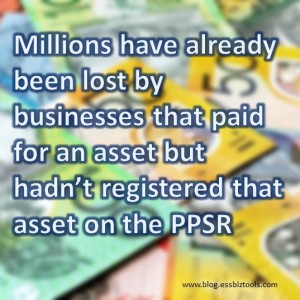Posted: 09 June 2015
The PPSA can send businesses broke!
There have been over 50 court cases relative to the Personal Property Securities Act (PPSA) and the associated Personal Property Securities Register (PPSR) since the legislation was introduced to Australia.
There have been numerous events, not all of which have resulted in court cases. These events have contributed to businesses losing millions of dollars, thought to be in the vicinity of at least $40million, mainly through ignorance of the ramifications of the legislation through failure to register transactions on the PPSR.
 I find it very difficult to comprehend how a business that applied an asset or borrowed money to purchase an asset can lose that asset because they’ve not registered that asset on a government register.
The government of the day didn’t offer realistic training to business operators relative to the “far-flung” effects of this legislation, which is like a quagmire for small/medium enterprises and some bigger businesses.
There is a lot of confusion about this legislation.
“Personal property” doesn’t appear to be the correct, descriptive name for this legislation. This isn’t about personal property, it’s about business property. This begs the question as to why the government didn’t call it “business property”.
The definition of “personal property” covers all forms of property other than real estate. This means that the so-called “personal property” includes a vast range of business property, including:
• stock
• stock on consignment
• motor vehicles
• goods stored in someone else’s possession
• goods attached to other goods
• mixed goods
• debtors
• livestock on agistment
• storing of equipment on someone else’s property
• temporary work on a construction site
• tradesmen’s plant and equipment
• intangibles such as licences shares, intellectual property
• cranes
• machinery
• artist’s works such as sculptures and paintings
• rare coins
• rare carpets
• tenant’s plant and equipment
Some people claim that establishing businesses to avoid the problems is legal work. There’s definitely a requirement for legal work in the preparation of appropriate documents for Terms of Trade and Retention of Title.
However, the due diligence review of a business’ internal systems, to monitor whether the various transactions that can cause problems under this legislation have been identified, is probably a process that, we believe accountants, as trusted advisers to small businesses, are best place to deliver for the benefit of their clients.
Whilst in most cases, there will need to be an “insolvency event” occur to trigger a potential problem under this legislation, we believe it’s a good practice to ensure your client has implemented appropriate systems to protect themselves long before an “insolvency event” occurs. This is risk management, a job that we believe accountants should be offering to perform on behalf of their clients.
ESS BIZTOOLS has developed a PPSR Due Diligence System to assist accountants to undertake the due diligence process. If you would like further details on the PPSR Due Diligence System, please contact us.
To download the free material click the link below:-
I find it very difficult to comprehend how a business that applied an asset or borrowed money to purchase an asset can lose that asset because they’ve not registered that asset on a government register.
The government of the day didn’t offer realistic training to business operators relative to the “far-flung” effects of this legislation, which is like a quagmire for small/medium enterprises and some bigger businesses.
There is a lot of confusion about this legislation.
“Personal property” doesn’t appear to be the correct, descriptive name for this legislation. This isn’t about personal property, it’s about business property. This begs the question as to why the government didn’t call it “business property”.
The definition of “personal property” covers all forms of property other than real estate. This means that the so-called “personal property” includes a vast range of business property, including:
• stock
• stock on consignment
• motor vehicles
• goods stored in someone else’s possession
• goods attached to other goods
• mixed goods
• debtors
• livestock on agistment
• storing of equipment on someone else’s property
• temporary work on a construction site
• tradesmen’s plant and equipment
• intangibles such as licences shares, intellectual property
• cranes
• machinery
• artist’s works such as sculptures and paintings
• rare coins
• rare carpets
• tenant’s plant and equipment
Some people claim that establishing businesses to avoid the problems is legal work. There’s definitely a requirement for legal work in the preparation of appropriate documents for Terms of Trade and Retention of Title.
However, the due diligence review of a business’ internal systems, to monitor whether the various transactions that can cause problems under this legislation have been identified, is probably a process that, we believe accountants, as trusted advisers to small businesses, are best place to deliver for the benefit of their clients.
Whilst in most cases, there will need to be an “insolvency event” occur to trigger a potential problem under this legislation, we believe it’s a good practice to ensure your client has implemented appropriate systems to protect themselves long before an “insolvency event” occurs. This is risk management, a job that we believe accountants should be offering to perform on behalf of their clients.
ESS BIZTOOLS has developed a PPSR Due Diligence System to assist accountants to undertake the due diligence process. If you would like further details on the PPSR Due Diligence System, please contact us.
To download the free material click the link below:-
 I find it very difficult to comprehend how a business that applied an asset or borrowed money to purchase an asset can lose that asset because they’ve not registered that asset on a government register.
The government of the day didn’t offer realistic training to business operators relative to the “far-flung” effects of this legislation, which is like a quagmire for small/medium enterprises and some bigger businesses.
There is a lot of confusion about this legislation.
“Personal property” doesn’t appear to be the correct, descriptive name for this legislation. This isn’t about personal property, it’s about business property. This begs the question as to why the government didn’t call it “business property”.
The definition of “personal property” covers all forms of property other than real estate. This means that the so-called “personal property” includes a vast range of business property, including:
• stock
• stock on consignment
• motor vehicles
• goods stored in someone else’s possession
• goods attached to other goods
• mixed goods
• debtors
• livestock on agistment
• storing of equipment on someone else’s property
• temporary work on a construction site
• tradesmen’s plant and equipment
• intangibles such as licences shares, intellectual property
• cranes
• machinery
• artist’s works such as sculptures and paintings
• rare coins
• rare carpets
• tenant’s plant and equipment
Some people claim that establishing businesses to avoid the problems is legal work. There’s definitely a requirement for legal work in the preparation of appropriate documents for Terms of Trade and Retention of Title.
However, the due diligence review of a business’ internal systems, to monitor whether the various transactions that can cause problems under this legislation have been identified, is probably a process that, we believe accountants, as trusted advisers to small businesses, are best place to deliver for the benefit of their clients.
Whilst in most cases, there will need to be an “insolvency event” occur to trigger a potential problem under this legislation, we believe it’s a good practice to ensure your client has implemented appropriate systems to protect themselves long before an “insolvency event” occurs. This is risk management, a job that we believe accountants should be offering to perform on behalf of their clients.
ESS BIZTOOLS has developed a PPSR Due Diligence System to assist accountants to undertake the due diligence process. If you would like further details on the PPSR Due Diligence System, please contact us.
To download the free material click the link below:-
I find it very difficult to comprehend how a business that applied an asset or borrowed money to purchase an asset can lose that asset because they’ve not registered that asset on a government register.
The government of the day didn’t offer realistic training to business operators relative to the “far-flung” effects of this legislation, which is like a quagmire for small/medium enterprises and some bigger businesses.
There is a lot of confusion about this legislation.
“Personal property” doesn’t appear to be the correct, descriptive name for this legislation. This isn’t about personal property, it’s about business property. This begs the question as to why the government didn’t call it “business property”.
The definition of “personal property” covers all forms of property other than real estate. This means that the so-called “personal property” includes a vast range of business property, including:
• stock
• stock on consignment
• motor vehicles
• goods stored in someone else’s possession
• goods attached to other goods
• mixed goods
• debtors
• livestock on agistment
• storing of equipment on someone else’s property
• temporary work on a construction site
• tradesmen’s plant and equipment
• intangibles such as licences shares, intellectual property
• cranes
• machinery
• artist’s works such as sculptures and paintings
• rare coins
• rare carpets
• tenant’s plant and equipment
Some people claim that establishing businesses to avoid the problems is legal work. There’s definitely a requirement for legal work in the preparation of appropriate documents for Terms of Trade and Retention of Title.
However, the due diligence review of a business’ internal systems, to monitor whether the various transactions that can cause problems under this legislation have been identified, is probably a process that, we believe accountants, as trusted advisers to small businesses, are best place to deliver for the benefit of their clients.
Whilst in most cases, there will need to be an “insolvency event” occur to trigger a potential problem under this legislation, we believe it’s a good practice to ensure your client has implemented appropriate systems to protect themselves long before an “insolvency event” occurs. This is risk management, a job that we believe accountants should be offering to perform on behalf of their clients.
ESS BIZTOOLS has developed a PPSR Due Diligence System to assist accountants to undertake the due diligence process. If you would like further details on the PPSR Due Diligence System, please contact us.
To download the free material click the link below:-
{snippet free-report}
Podcast 'Accountant's Minute'
Latest business advisory news for Accountants in under a minute.
Episode 027 The PPSA can send businesses broke!
Podcast Link:As their trusted advisor, can you assist your SME clients with business advisory services?
To download the free material click the link below:-{snippet free-report}
Watch out for the next episode of "Accountant's Minute" or subscribe to the podcast on iTunes for more news, ideas and tips on providing outstanding non-compliance services to SME clients.
























































